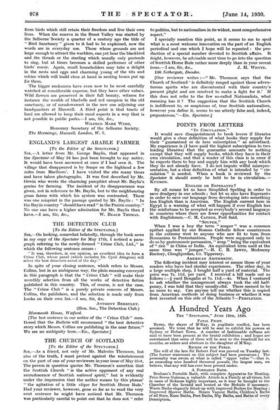POINTS FROM LETTERS "IN CIRCULATION."
It would save disappointment to book lovers if libraries would give a clear definition of what books they supply for their " guaranteed or de luxe subscription " as advertised. My experience is (I have paid the highest subscription to two leading libraries) that the guarantee amounts to nothing except that they will supply books, which they have in their own circulation, and that a reader of this class is in error if he expects them to buy and supply him with any book which they do not already have. I do not impute wilful misrepre- sentation, but a clear definition of what is intended by " cir- culation " is needed. When a book is reviewed by the Spectator it should surely be held to be in circulation.— Kyrnitox.
ENGLISH OR ESPERANTO ?
By all means let us have Simplified Spelling in order to save drudgery in our schools ; but let us also have Esperanto in order to save our language from developing into something less English than is American. The English .current here in Egypt is a warning of what will happen if ever English has the misfortune to be accepted as everybody's second language in countries where there are fewer opportunities for contact with Englishmen.—C. M. CATHER, Port Said.
"SOUPER."
When I was a boy the term " souper " was a common epithet applied by our Roman Catholic fellow countrymen in the extreme west to anyone who saw fit to turn from Romanism to Protestantism. People were supposed only to do so by gastronomic persuasion, " soup " being the equivalent of " rice ' in China or India. An equivalent term used at the
same time was " jumper."—B. IL Iawn.r,• Modreeny Rectory, Cloughjordan, Co. Tipperary.
AMERICAN ARITHMETIC.
The following incident may interest or amuse those of your readers who have had similar experiences. The other day, in a large multiple shop, I bought half a yard of material. The price was 7s. 1Id. per yard. I received a bill made out as follows yard Bengalin at 7s. ltd.-4s. When I ventured to ask whether the management always took the old • half- penny, I was told that they usually did.. There seemed to be no more to say. Can anyone tell me whether this is copied from American methods of doing business or whether it was first invented on this side of the Atlantic ?—PERPLEXED


































 Previous page
Previous page